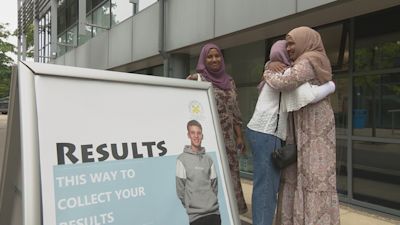Backlash as thousands of England A-level results downgraded

Video report by ITV News Meridian's Social Affairs Correspondent Christine Alsford
Students in England have expressed their frustration after thousands of A-Level results have been downgraded, as this year's summer exams were cancelled due to the coronavirus pandemic.
The figures come despite record-high results and an increase in the number of students accepted onto university courses in the UK.
Exam boards downgraded nearly 40% of school leavers' grades in England, according to data from Ofqual – which amounts to around 280,000 entries being adjusted down.
Teachers were told to submit the grades they thought each student would have received if they had sat the papers, alongside a rank order of students, after exams were cancelled amid the pandemic.
Exam boards then moderated these grades to ensure this year's results were not significantly higher than previous years and the value of students' grades were not undermined.
Students at Queen Mary's College in Basingstoke were anxious to receive their results on Thursday, with some saying it was a "worrysome" and "stressful" time.
A level student Ciaron Cooney achieved four A*s and is now off to UCL to study medicine.
He says he received lots of support from the college in the lead up to results day.
The Principal of Queen Mary's College, Ali Foss, is pleased with all of the results but says some students who came to the college with "low prior achievements" have been "penalised the most", with some dropping by two grades which is "not fair".
Last minute changes to the grading system were brought in by the government late on Tuesday, offering students in England a “safety net” of being able to use mock exam results as the basis for an appeal, if they are higher than the calculated grade.
The 11th hour change came hours after Scotland’s Education Secretary announced that moderated calculated grades would be scrapped following an outcry after more than 124,000 results were downgraded.
The Vice Chancellor of the University of Portsmouth, Professor Graham Galbraith, says the last minute change was "disappointing" as there was no consultation with the sector which meant that universities could not "prepare properly".
How have exam results been downgraded?
Exam boards downgraded 39.1% of pupils' grades in England - equating to nearly 2 in five students having their results hit.
Despite this the top grades reached record highs. The proportion of A-level entries awarded an A grade or higher rose to 27.9% - an all-time high - figures for England, Wales and Northern Ireland show.
Overall the proportion of entries in England, Wales and Northern Ireland awarded the top A* grade this year surged to 9% – the highest proportion since the top grade was first introduced in 2010.
In England, the majority of downgrades were by a single grade - a total of 35.6%.
Fewer were brought down by two grades (3.3%) while 0.2% came down by three grades, figures from Ofqual show.
The figures, published by the Joint Council for Qualifications, cover A-level entries from students in England, Wales and Northern Ireland where around 300,000 students are receiving their results.
Houzeefa Zaffar, who is a student at Oxford Spires Academy was "shocked" and "disappointed" at his results.
He received an A and two Bs but was anticipating As and A*s across the board.
Tayla Hardy, who is a student at Maidstone Grammar School for Girls, was predicted two A*s and two As.
However, she ended up with three As and a B, leaving her place at Cambridge to study psychology uncertain. She says she's going to appeal her grades.
Despite the downgrading of results, more students have been accepted on to UK degree courses this year.
A total of 358,860 pupils have taken up places so far - an increase of 2.9% on the same point last year - according to data published by the university admissions service, Ucas.
A-level students struggled to access the Ucas website on Thursday morning, however, after it crashed amid "technical issues".
Pupils complained about not being able to access the "track" section of the website - leaving thousands unable to find out whether they got the grades needed to head to university.
Responding to frustrated students on Twitter, the site said: "Ucas Track is now running as usual, we’re really sorry it was running slowly. We’re here to help if you need us."
Education Secretary Gavin Williamson said on Thursday's results day that he had asked universities to "show the maximum amount of flexibility".
Mr Williamson has been forced to defend the 11th hour changes to the results system amid criticism from unions.
Geoff Barton, general secretary of the Association of School and College Leaders (ASCL), said teachers are likely to face questions from “disgruntled” students over appeals on Thursday which they will struggle to answer due to the last-minute announcement and lack of detail about how the process will work.
But Mr Williamson told ITV News: "There is nothing that I won't do to make sure we have the maximum amount of fairness for students at this time."
What is the breakdown of the UK's university acceptances ?
Initial Ucas figures show 34,310 international students from outside the EU have been accepted - up 2%.
Acceptances from students within the EU have fallen by 15.2%, with 22,430 accepted this year.
The number of school leavers accepting places on undergraduate courses in the UK has risen by 1.6% compared to last year.
While the number of applicants accepted onto their first choice of course increased too, up 2.7% on the same point in 2019.
Despite a drop in the population of their age group across the UK, the number 18-year-olds taking up places has risen to 30.2%.
So far, 4% of placed UK students are currently planning to defer starting their course - the same proportion as 2019 - despite Covid-19 disruptions.